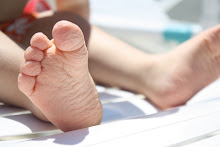This issue of dreams is risky business. We're always told to dream, and to dream big. Nothing is out of our reach so long as we roll our sleeves back, our pants up, and get neck-deep in the process. We need to get dirty, stress, suffer - and with all the hard work, we'll get to that dream.
Trouble is, we tend to have many dreams. At least I know I do. It seems as with human nature, we're not content in reaching one destination. We're always pushing for more. I can think of a slew of cliched phrases that demonstrate this, starting with: "The grass is always greener on the other side." I say "starting with" because that's why we dream. We want something other than what we have in the present. I'm no exception. I'm always dreaming of something else. Fo example, I dream of leaving South Florida. I'm tired of the traffic, the rude (and highly volatile) drivers, the packed cement blocks. I'm tired of the fast-pace of the city. I dream of open land, pastures, green (that doesn't involved painted trash cans). I dream of friendly people, like those I met in Virginia, who, instead of saluting with the middle finger, gave friendly waves and hellos, even though we were outsiders. I also dream of writing full time. Dedicating the hours while my son is in school, to writing down all these characters and memories that plague my mind. Sometimes, I even dream of inventing some sort of time machine to go back to a healthier, livelier, more energized me.
The problem with these dreams is they interfere with my living today and now. I think there's a saying that says something akin to: the past already happened, the future is yet to come, but today is a gift. That's why it's called the present. In dreaming so much of tomorrow, and in working so much for a future (retirement, fame, whatever), we oftentimes neglect today. And in today lies family and friends. When it's all said and done (I'm just full of cliches today, aren't I?), what do we have to look back at in our lives? Will we be happy? Will we be satisfied that we did all we could do at each stage?
I find myself often at this point, stuck between the dreamer and the realist. I remember my godparents, who worked their behinds off (might as well keep at it with these trite expressions), saving up for an unsure future, only to die in a plane crash in Long Island, on their way back from Colombia after the Christmas and new year holidays in 1990. What was that worth? Then again, if no planning is done, no dreams to pursue, our future might be just as bleak. There's no denying that retiring here, with nothing but Social Security (if that) is simply not possible. What's the right answer? Is there one?
I don't have the answers. I am pretty sure, though, they lie somewhere between dreaming and planning, drifting and cementing roots. There's got to be some balance there.
Disney, Dec 2010
14 years ago















